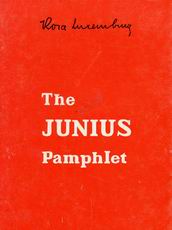
The Junius Pamphlet
The Crisis of Social Democracy
Luxemburg, Rosa
http://www.connexions.org/CxArchive/MIA/luxemburg/1915/junius/index.htm
http://www.marxists.org/archive/luxemburg/1915/junius/index.htm
Year Published: 1916
Pages: 227pp Dewey: 331.88
Resource Type: Book
Cx Number: CX6342
The voting of war credits in August 1914 was a shattering moment in the life of individual socialists and of the socialist movement in Europe. Those who had worked for, and wholly believed in the ability of, organized labour to stand against war now saw the major social democratic parties of Germany, France, and England rush to the defense of their fatherlands. Worker solidarity had proved an impotent myth. Rosa Luxemburg had for years warned against the stultifying effects of the overly bureaucratized German Social Democratic Party and the anti-revolutionary tendencies of the trade unions that played such a large role in the party's policy decisions. She spent much of the war in jail, where she wrote and then smuggled this pamphlet. Published under the name "Junius," the pamphlet became the guiding statement for the International Group, which became the Spartacus League.
Abstract:
Excerpt:
The class-conscious proletariat cannot identify with any of the military camps in this war. Does it follow that proletarian policy ought to demand maintenance of the status quo, that we have no other action program beyond the wish that everything should be as it was before the war? But existing conditions have never been our ideal; they have never expressed the self-determination of peoples. Furthermore, the earlier conditions are no longer to be saved; they no longer exist, even if historic state borders continue to exist. Even before its results have been formally established, the war has already brought about immense confusion in power relationships, the reciprocal estimate of forces, of alliances, and conflicts. It has sharply revised the relations between states and of classes within society. So many old illusions and potencies have been destroyed, so many new forces and problems have been created that a return to the old Europe as it existed before August 4, 1914 is out of the question. [It is] as out of the question as a return to pre-revolutionary conditions even after a defeated revolution.
Proletarian policy knows no retreat; it can only struggle forward. It must always go beyond the existing and the newly created. In this sense alone, it is legitimate for the proletariat to confront both camps of imperialists in the world war with a policy of its own.
But this policy can not consist of social democratic parties holding international conferences where they individually or collectively compete to discover ingenious recipes with which bourgeois diplomats ought to make the peace and ensure the further peaceful development of democracy. All demands for complete or partial 'disarmament,' for the dismantling of secret diplomacy, for the partition of all multinational great states into small national one, and so forth are part and parcel utopian as long as capitalist class domination holds the reins. [Capitalism] cannot, under its current imperialist course, dispense with present-day militarism, secret diplomacy, or the centralized multinational state. In fact, it would be more pertinent for the realization of these postulates to make just one simple "demand": abolition of the capitalist class state.
It is not through utopian advice and schemes to tame, ameliorate, or reform imperialism within the framework of the bourgeois state that proletarian policy can reconquer its leading place. The actual problem that the world war has posed to the socialist parties, upon the solution of which the destiny of the workers' movement depends, is this: the capacity of the proletarian masses for action in the battle against imperialism. The proletariat does not lack for postulates, prognoses, slogans; it lacks deeds, the capacity for effective resistance to imperialism at the decisive moment, to intervene against it during [not after] the war and to convert the old slogan 'war against war' into practice. Here is the crux of the matter, the Gordian knot of proletarian politics and its long term future.
Imperialism and all its political brutality, the chain of incessant social catastrophes that it has let loose, is undoubtedly an historical necessity for the ruling classes of the contemporary capitalist world. Nothing would be more fatal for the proletariat than to delude itself into believing that it were possible after this war to rescue the idyllic and peaceful continuation of capitalism. However, the conclusion to be drawn by proletarian policy from the historical necessity of imperialism is that surrender to imperialism will mean living forever in its victorious shadow and eating from its leftovers.
Subject Headings


